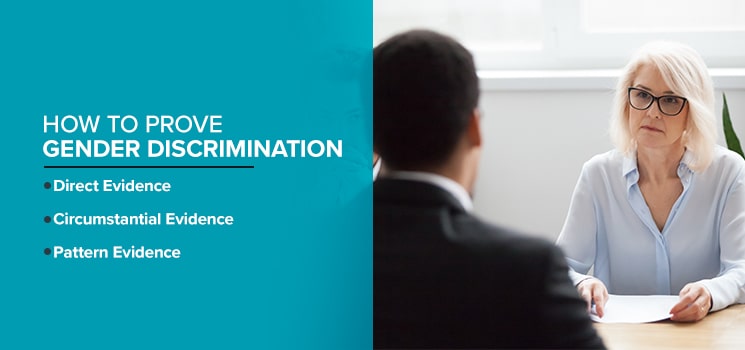Discrimination cases can be challenging, but you must first determine if you have a case. Circumstantial evidence is sometimes not enough to go on, and only an experienced lawyer can uncover enough evidence to prove your case. If you believe you have experienced gender discrimination, you may be wondering what you need to make a case against your employer.
What Is Gender Discrimination?
Gender discrimination is the unfair treatment of a group of people based on their sex, gender identity or pregnancy status. Title VII of the Civil Rights Act prohibits an employer from treating you unfairly based on these characteristics or stereotypes associated with them. Gender discrimination in the workplace is when a person, or group of people, is treated unfavorably when it comes to hiring, firing, pay, promotions, benefits or any other aspect of employment.
Harassment is another form of gender discrimination that can happen in the workplace. Sexual harassment is against the law, and it can result in a hostile work environment or an unfair employment decision. It includes unwanted sexual advances, comments of a sexual nature and offensive remarks regarding a person’s sex, gender identity, sexual orientation or pregnancy.
Can You Sue Your Employer for Gender Discrimination?
The first question you may have is if you can sue your employer for gender discrimination. You have the legal right to work in a safe environment free from discrimination. Discrimination is prohibited when it comes to any element of employment, such as:
- Hiring
- Firing
- Pay
- Job assignments
- Promotions
- Training
- Benefits
- Conditions of employment
Any kind of harassment based on your gender or any other legally protected class that causes a hostile work environment is also prohibited, whether by a supervisor, coworker or others associated with your employer. If you think you have experienced something that could be harassment, you may be able to sue for it.
You may need to discover if you are a victim of individual discrimination or systemic discrimination. Individual discrimination would be the intentional unfair treatment of a single employee based on sex, gender identity or pregnancy status. Systemic discrimination is widespread through practices or policies and applies to a whole class of employees.
How to Prove Gender Discrimination
You will need evidence of the discriminatory act to sue your employer. Both direct evidence and circumstantial evidence can be considered in a discrimination case. If you have direct evidence, it may make your case easier. But even if you only have circumstantial evidence, you still may be able to sue your employer for gender discrimination depending on the amount of evidence. Evidence to prove systemic discrimination often needs to show a repeated pattern.
Direct Evidence
If you have direct evidence that your employer participated in a discriminatory act, your discrimination lawsuit could be a bit more straightforward. A written statement that you were treated unfairly based on sex, gender identity or pregnancy status can help prove the discrimination happened. A verbal statement is also direct evidence but can be tricky to prove if you were the only one to hear it.
Circumstantial Evidence
Circumstantial evidence is much more common. Circumstantial evidence is an inference that can be made from proven facts. For example, if you were fired shortly after your employer found out you were pregnant, that may be circumstantial evidence of discrimination.
While that may not be enough to prove discrimination, it can be part of a bigger case. You may need many examples of this kind of action to bring a successful lawsuit forward.
Pattern Evidence
To prove systemic discrimination, you often need evidence that shows a clear pattern. This can require gathering a large amount of data and statistics from a sometimes unwilling employer. The evidence would have to show, repeatedly, that people with the characteristic in question were treated unfairly when compared to others with similar qualifications.
First Steps to Take After Gender Discrimination
If you believe you have a gender discrimination case, there are steps to take and deadlines to meet. Many of these steps have different deadlines and paperwork requirements, so you will need to know what applies to you. Consult with a lawyer throughout the process, as they will know exactly what you will need to do considering your state, employer and specific situation.
Here are the general steps you will need to follow:
1. Make a Complaint to Your Employer
You will have to decide if you need to first make a complaint to your employer. Read your employee handbook and review any policies that may be in place regarding gender discrimination. Follow the outlined steps and make sure to make your complaint in writing and save a copy for your records. Keep in mind that retaliation against you for making a complaint is also illegal.
2. File a Complaint With the EEOC
In gender discrimination cases, except those regarding the Equal Pay Act, it is required that you file an agency complaint. In Pennsylvania, you have up to 300 days after the act of discrimination to file a charge with the U.S. Equal Employment Opportunity Commission (EEOC). For state claims under the Pennsylvania Human Relations Act (PHRA), you have 180 days. Then you will have to wait for a response.
The EEOC will send a notice of your charge to the employer, who will have a chance to respond. The EEOC may investigate or request more information.
3. Decide if You Will Sue
If the investigation shows there is reason to believe discrimination took place, the EEOC will respond with a Letter of Determination. The involved parties will be offered a chance to participate in a conciliation process. If it is unsuccessful, the EEOC may litigate or issue a Notice of Right to Sue. If they issue that notice, you only have 90 days to file the lawsuit. Deadlines and requirements vary by state and situation, so it is best to consult with a discrimination lawyer.
Get a Free Consultation With Weisberg Cummings, P.C.
If you think you may have a case for gender discrimination, you will likely need an experienced lawyer to help you get through the complicated process. Failing to follow the correct procedures can make your case ineligible. Weisberg Cummings specializes in employment law and will help you determine if you have a case and also help you gather the evidence you will need. We take a client-focused approach and can work with you to decide the legal action appropriate to your specific situation.
Weisberg Cummings serves Harrisburg, Lancaster, Lebanon, Reading, York, Mechanicsburg and other areas across Pennsylvania. We have over 40 years of combined experience with situations like yours. We can answer your questions and help you determine the next step. When you are ready to see if you have a gender discrimination case, book a free consultation with us.



